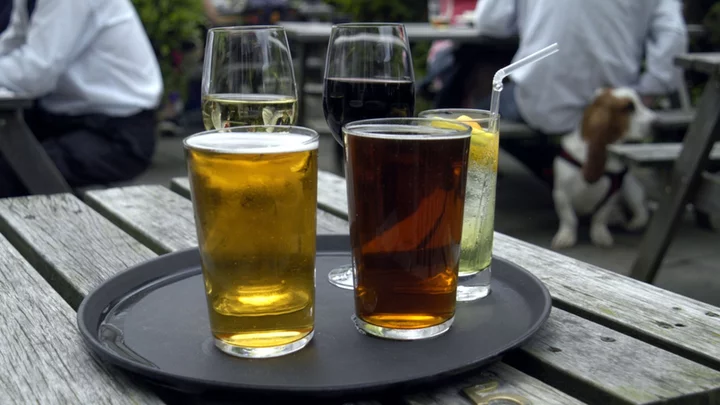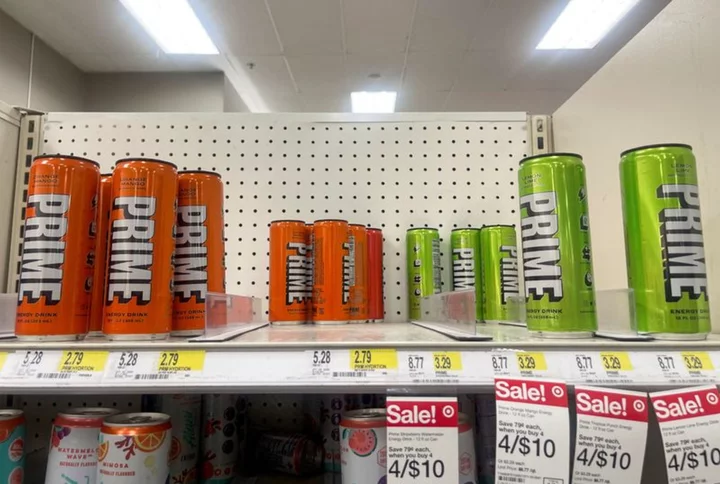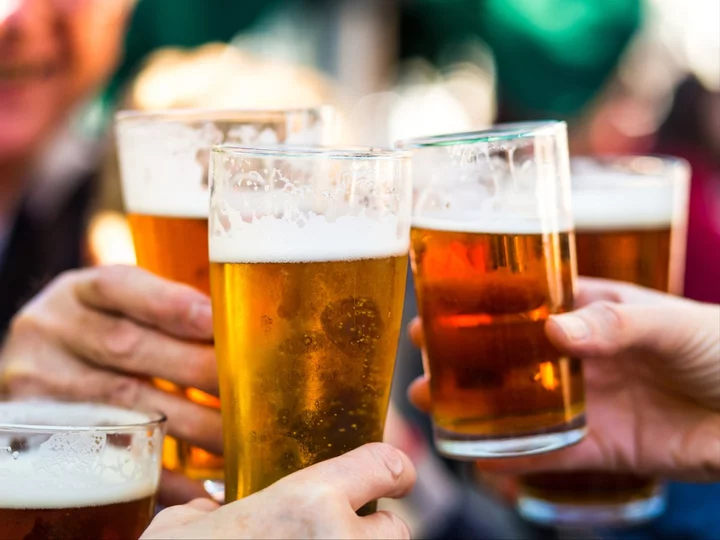
A parasite was found in a Baltimore reservoir and vulnerable residents should take precautions
A microscopic parasite was detected in the Druid Lake Reservoir in Baltimore, Maryland and vulnerable residents are being told to take precautions. Traces of Cryptosporidium were found in the lake during a routine test by the Baltimore City Department of Public Works crew members.
2023-09-30 23:55

Binge-drinking: 'I was stuck in a cycle of self-destruction'
Three women with experiences of binge-drinking share their stories of completely quitting alcohol.
2023-09-16 14:20

Rising caffeine levels spark calls for ban on energy drink sales to children
By Kailyn Rhone Pediatricians and parents are calling for the U.S. to treat new high-caffeine energy drinks like
2023-08-30 18:56

Russia: Chechen agriculture minister to run seized Danone unit
Yakub Zakriev is a deputy prime minister and the agriculture minister of the Russian republic of Chechnya.
2023-07-19 13:21

US FDA reviewing concerns over Logan Paul's PRIME energy drink
The U.S. Food and Drug Administration said on Wednesday it is reviewing concerns raised by Senate Majority Leader
2023-07-13 07:25

Schumer asks FDA to investigate Logan Paul's PRIME energy drink
By Laura Sanicola U.S. Senate Majority Leader Chuck Schumer on Sunday called on regulators to investigate a popular
2023-07-10 07:55

Nutritionist explains how women can eat to help balance hormones
Some healthy eating principles apply to just about everyone – drinking enough water and consuming plenty of fresh fruit and veg, for example. But when it comes to hormones, a lot of diet advice neglects to mention the vast difference between women’s and men’s health. “Women are very under-represented in research, mainly because we have a menstrual cycle,” says functional nutritionist and author Pauline Cox. “My passion and mission is to empower women with the information and knowledge that can radically change their immediate health and their long-term health.” Cox, 43, who started her career as a physiotherapist before becoming a nutritionist, now mainly works with groups of women online and has just released her second book, Hungry Woman: Eating for Good Health, Happiness and Hormones. “I felt there was a lot of information that could be shared with women to help them understand their hormones, and understand that we don’t have to get frustrated with ourselves and fight our female physiology.” At the heart of the issue is the balance (or lack thereof) between oestrogen and progesterone levels. “When our progesterone levels are low, our oestrogen can become dominant, and that’s when we start to see things like PMS, heavy periods, painful periods, flooding at the beginning of our periods,” says Cox, who lives in Somerset. “A lot o women accept that as part of their monthly cycle, but when we bring our progesterone levels back up, it helps to balance the effect of oestrogen.” Here, she explains five ways women can tailor their diets to keep their hormones in check… 1. Look after your liver “Oestrogen is a driving-growth hormone,” Cox explains, using the analogy of grass growing on a lawn to explain how the two hormones interact. “Progesterone is like the lawnmower. It comes along and it keeps the grass in check. When we lose progesterone, oestrogen gets out of control.” That’s why it’s important that our bodies are able to clear oestrogen efficiently through the liver, gut and bowels. “How much oestrogen we clear can be influenced by what we eat and how we live,” says Cox. “There’s a lot of cruciferous in the book – cauliflower, broccoli, these are really great vegetables to support liver detoxification.” 2. Add fermented foods To deliver beneficial bacteria to your gut, try including fermented foods like pickled vegetables, kefir, kombucha or natural yoghurt as part of your daily diet. “Our gut diversity declines as we age and microbiome diversity has been linked with longevity and good health,” says Cox, who suggests just a tablespoon of sauerkraut a day can make a difference. “These are easy wins… to maximise our longevity and optimise our gut-brain axis, which is incredibly important.” 3. Avoid ultra-processed foods There’s been a lot of talk recently about how detrimental ultra-processed foods are, and that includes the effect on hormone levels. “When we’re eating high sugar, processed foods, our inflammatory levels go up and our cortisol level goes up, which robs us of progesterone,” Cox says. Plus, filling up with these empty calories – as delicious as they often are – means we have less room for nutritious foods. “They can often be devoid of nutrients, so you’re not getting the nutrients you need for building hormones and supporting hormonal health like magnesium, zinc, B vitamins, and omega three fatty acids.” 4. Create an eating window It’s not just what you eat, it’s when. Cox recommends having an ‘eating window’ during the day that ends around 6pm, so that there’s a gap of a few hours before you go to bed. “When your blood sugars go up at night, your kidneys have to kick in to try and remove this excess blood sugar, which then means you’re up in the night urinating,” she says. “A lot of women associate this with drinking a lot before bed, but actually eating late at night can also be for that reason.” Choosing meals that are nutritious and satisfying is the next step. “Within that window, start becoming a bit more conscious of your carbs and upping your protein,” she continues. “So you’re feeling full, your body’s getting all the amino acids it needs, and you’re maybe not having so much of the grab-and-go food like the sandwiches, the pasta, the crisps.” 5. Monitor your magnesium “Most women are sub-clinically deficient in magnesium,” Cox explains, which can cause insomnia, and the risk increases with age. “As we get to about the age of 40, we absorb less magnesium than we would have in our 20s.” Diet also plays a role: “If we have high blood sugars and levels of inflammation when we’re stressed, we lose magnesium.” She recommends taking a magnesium glycinate or bisglycinate supplement before bed to increase your chance of getting a good night’s sleep. “The glycine part of that helps to reduce your core body temperature, which is what the body wants when it’s going to bed,” she says. “That compound also helps get you into what’s called REM sleep, which is the sleep where you’re consolidating memories and learning.” ‘Hungry Woman’ by Pauline Cox (Ebury Press, £27). Read More From hairdressers to aloe vera: What will Diet Coke join as a ‘possible cancer risk’ Three quick and easy vegan fakeaway recipes The only three recipes you need to seize the summer How to shop at Borough Market in the summer
2023-07-03 21:19

India's spirited rum revolution
A host of homegrown brands are innovating with the spirit, creating new markets.
2023-07-02 07:56

Biden admits using sleep apnoea treatment device
The president uses a CPAP machine, the White House said after reporters spotted marks on his face.
2023-06-29 07:50

Ukraine dam: Satellite images reveal Kakhovka canals drying up
Following the destruction of the Kakhovka dam, BBC analysis reveals the changes in the surrounding area.
2023-06-22 08:17

Americans are drinking alcohol at levels not seen since the Civil War, report says
As if 2023 wasn’t hard enough, Americans are now drinking as much alcohol as they did during the Civil War days. A new report from the National Institute on Alcohol Abuse and Alcoholism (NIAAA) has found that the average American drinks about the same amount of alcohol as people did in 1860. In 2021, Americans consumed 2.51 gallons of ethanol – the alcohol found in wine, beer, and spirits – compared to 2.53 gallons at the brink of the Civil War. That amount, which doesn’t include water or other ingredients found in alcoholic beverages, marks a 60 per cent increase in liquor consumption compared to the mid-1990s. Americans have also changed their taste for alcohol. The amount of beer consumed has dropped nearly 20 per cent since 1995, while wine has steadily become America’s drink of choice. Now, 50 per cent more Americans are drinking wine than they did in the mid-1990s. This isn’t the only time the United States has seen staggering levels of alcohol consumption. In 1934, following the repeal of the Prohibition Act, Americans were drinking one gallon of ethanol per person. At the end of World War II in 1945, Americans reached 2.3 gallons. This, compared to 2.8 gallons in 1980, when alcohol consumption was at its highest. The rise in alcohol consumption may also have to do with a key demographic: women. In March, it was revealed that women in the US are out-drinking men for the first time in history. Dr George Koob, director of the NIAAA, recently told the Washington Examiner that binge drinking among college students are to blame. “In 2021, there has been an uptick, particularly among women. Now it turns out on college campuses women are actually binge drinking more than men, for the first time in history,” he told the conservative media outlet. The Covid-19 pandemic also saw a dramatic shift in alcohol consumption, as most states declared liquor stores were considered “essential businesses”. In 2020, the first year of the pandemic, sales of alcohol increased by 2.9 per cent, the biggest annual increase in more than 50 years, according to the NIAAA. Now, with college campuses back in session and local bars open again, Koob attributed the rising trend of women binge drinking to the “alcohol deprivation effect” – in which people “rebound in drinking” after a period of abstaining from alcohol. “A standard drink is 1.5 ounces of vodka, 12 ounces of beer, or five ounces of wine,” he said. “When you go past a standard drink, you really are getting to the point where alcohol ultimately becomes a toxin. You can easily overdose.” The Centers for Disease Control and Prevention (CDC) says that it’s safe for women to drink no more than one standard alcoholic beverage a day, and no more than two for men. However, binge drinking usually corresponds to five or more drinks on a single occasion for men, while four or more drinks on a single occasion for women. Read More Moderate alcohol consumption may lower stress, reduce heart disease risk, study finds Man dies after eating raw oysters from Missouri seafood stand Hip surgery policies based on weight ‘worsen health inequality’, study warns TikToker cooks rack of ribs in hotel bathroom using only items from his room BBQ salad recipes without a soggy lettuce leaf in sight How to shop for and cook Japanese food at home like a pro
2023-06-14 08:19

FBI reveals 1980s plot to kill Queen Elizabeth II
Newly released FBI documents say there were “ever-present“ IRA threats during her US visits.
2023-05-26 06:49
